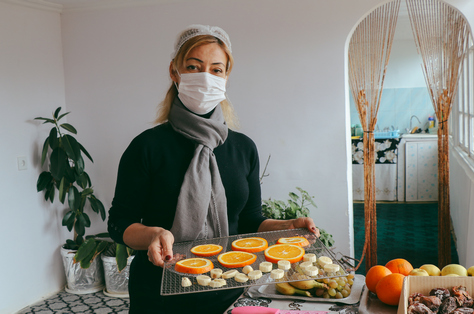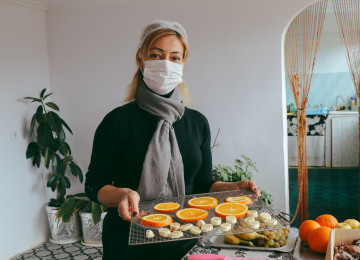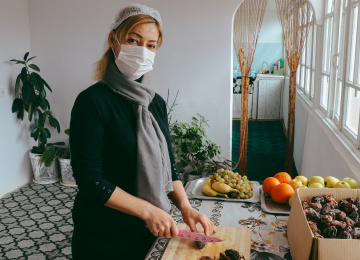
From the village of Mukhakh in the Zaqatala district in north-western Azerbaijan, Tahmina Isayeva started a small business drying fruits a few months before COVİD-19 hit the world. Although the pandemic was a real challenge for her business, she used it as an opportunity to raise her production to a new level.
Tahmina teaches in a village school and the rest of the time she is busy with her home and yard. In 2019, she attended a series of workshops on how to set up and develop your own business, including managing and bookkeeping, and computer and English language sessions.
“At the beginning, I preserved fruits by drying them simply as a hobby,” explains Tahmina. “ We arranged fruits on drying tray with space between them for good air circulation and then set the tray in the sun for several days. It’s the traditional method—but it’s a very long process.” Tahmina is now the first producer of dry fruits in Mukhakh.
One day, Isayeva decided to try selling her dried fruit. In 2019, the Women’s Resource Centre in Zaqatala awarded her a fruit-drying machine to help launch her business. “It started quite well and people in my community were the first to buy my products,” Tahmina recalls. “Over the year, I produced almost 300 kg of dried fruit. It wasn’t easy, as I was doing the entire process myself, starting with harvesting the apples, plums, Cornelian cherries, figs and other fruits in our garden. I bought more exotic fruit like banana, kiwi and orange from the bazaar in the wintertime.”
The dried fruit business was not previously popular in Zaqatala. Typically, Azeris bought some dry fruits for Novruz Bayram, their special celebration of the coming of spring. But a few years ago, interest in healthy food began to grow and locals began to buy such delicious snacks, rich in vitamins and minerals.
“After the COVID-19 pandemic, sales plunged, as people’s capacity to pay did too,” recalls Isayeva. “But I didn’t let that get me down. Instead, I began looking on the internet for tips for how to improve my business. Right now, I’m setting up the production process in our yard and plan to involve other women to work as a team.” Her plans include applying for national food safety registration with Azerbaijan’s Food Safety Agency in order to access the broader domestic market and expand her business.
To expand her business, Tahmina also applied to the “Development of sustainable and inclusive local food systems in the northwest region of Azerbaijan” project implemented by the Food and Agriculture Organization of the United Nations (FAO) with the financial support of the European Union as part of its EU4Business Initiative. This project is mainly focused on creating local inclusive, efficient models of farming and establishing a food system for select local products, facilitating access to markets by strengthening ties between producers and buyers, and expanding the potential of agritourism in the region. The project also makes it possible for small growers and processors to acquire the skills and knowledge they need to create profitable and sustainable agricultural enterprises.
“This kind of project is very useful and has a positive impact on us,” says Tahmina Isayeva. “Usually, rural women, especially on farms, are perceived as an invisible workforce and their role in rural communities is barely acknowledged. The project not only generates income-generating opportunities for rural women but also help them feel strong and confident. Greater socializing improves their status in the family and in their communities.”


